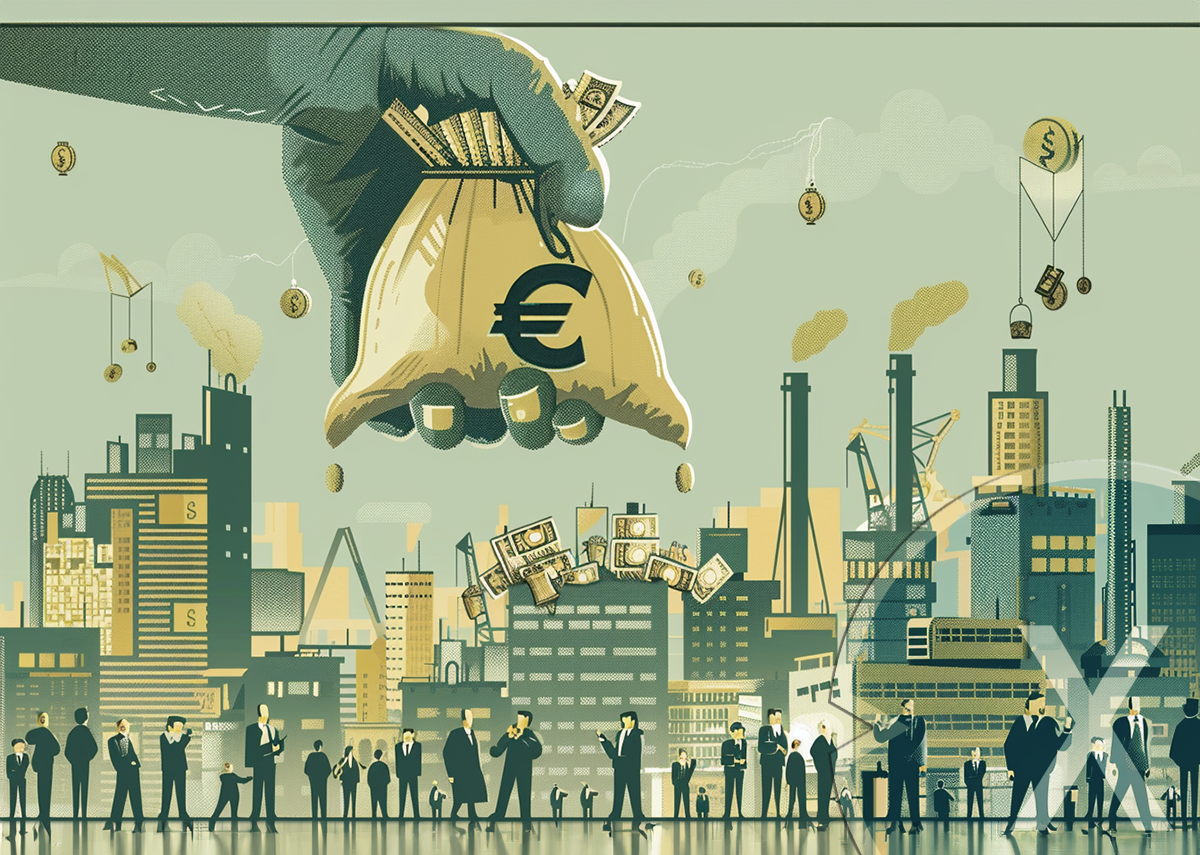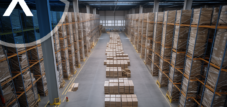Promotion without distorting competition? The subsidization of large German corporations: A critical view
Language selection 📢
Published on: September 29, 2024 / update from: September 29, 2024 - Author: Konrad Wolfenstein

Promotion without distorting competition? The subsidization of large German corporations: A critical view – Image: Xpert.Digital
🌟 Subsidization: promoting innovation and transformation without distorting competition?
🌟 A remarkable development has taken place in Germany in recent years: government support for the country's largest listed companies has increased dramatically. This development raises important questions about economic policy, the role of the state in the market economy and distributive justice.
📊 The numbers at a glance
The latest analysis by the renowned Flossbach von Storch Research Institute reveals an impressive increase in subsidies for DAX companies. In 2023, these donations reached a peak of at least 10.7 billion euros. This represents almost a doubling compared to the previous year, in which subsidies already amounted to 6 billion euros. The long-term trend is even more remarkable: in 2018, the annual subsidy amount was only around 2 billion euros. Overall, around 35 billion euros in public funds flowed into the coffers of the 40 DAX companies between 2016 and 2023.
📈 Reasons for the increase
The drastic increase in subsidies can be attributed to various factors:
1. Economic challenges
The COVID-19 pandemic and its consequences have presented many companies with existential challenges. The state was forced to launch extensive aid programs to secure jobs and prevent bankruptcies.
2. Energy transition and climate protection
The transformation towards a sustainable economy requires massive investments. Many subsidies are aimed at supporting companies in this transition and creating incentives for climate-friendly technologies.
3. International competitiveness
In a globalized market, German companies find themselves exposed to intense international competition. Subsidies can serve to maintain or improve competitiveness.
4. Structural change
Certain industries, such as the automotive industry, are undergoing profound change. Subsidies are intended to help make this process socially acceptable and promote innovation.
🏢 The biggest receivers
Among the DAX companies, there are some companies that particularly benefit from government subsidies. The largest recipients include:
1. Energy company
Corporations like E.ON and RWE receive extensive subsidies as part of the energy transition. These serve, among other things, to expand renewable energies and to compensate for the coal phase-out.
2. Automobile manufacturers
Companies such as Volkswagen, BMW and Mercedes-Benz benefit from funding for the development and production of electric vehicles as well as for building the necessary infrastructure.
3. Technology companies
Companies like Siemens or Infineon receive support for research and development in future technologies such as artificial intelligence or quantum computing.
4. Chemical and pharmaceutical companies
Companies like Bayer or BASF are supported in the development of new drugs or environmentally friendly production processes.
🛠️ Forms of subsidies
Government support for DAX companies takes place in a variety of ways:
1. Direct grants
These are non-repayable cash benefits that are granted for specific projects or investments.
2. Tax breaks
Companies can reduce their tax burden through special depreciation rules or tax relief.
3. Low-interest loans
The state or state-owned banks such as KfW grant loans at particularly favorable conditions.
4. Guarantees
The state guarantees loans that companies take out from private banks.
5. Research funding
Public funds flow into joint research projects between companies and scientific institutions.
6. Infrastructure measures
The state invests in infrastructure that benefits specific companies or industries, such as the expansion of charging stations for electric vehicles.
💬 Controversial discussion
The massive subsidies of large corporations are not without controversy. Proponents argue that this support is necessary to:
- To secure and create jobs
- To maintain the international competitiveness of German companies
- To strengthen Germany as a business location
- Accelerate the transformation towards a sustainable economy
- To promote innovation and enable technological progress
Critics, however, see the subsidies as a distortion of competition and an unjustified preference for large companies. They state that:
- Small and medium-sized companies are disadvantaged
- Inefficient structures are artificially kept alive
- Taxpayers subsidize the profits of private companies
- Market mechanisms are overridden
- There is a risk of false incentives and deadweight effects
🌍 International perspective
Subsidizing large companies is not a purely German phenomenon. A similar trend can be observed in many industrialized countries. A real subsidy race has developed, particularly in strategically important areas such as the semiconductor industry or battery technology. The European Union is trying to limit this trend through strict state aid rules, but at the same time it is under pressure to support European companies in global competition.
🔮 Future prospects
The question of how subsidy policy will develop in the coming years is the subject of intense debate. Some experts assume that the high amounts of subsidies are a temporary phenomenon that is linked to the particular challenges of recent years. Others see this as a long-term trend towards greater integration between the state and the economy.
What will be crucial is how politicians find the balance between necessary support and market economy principles. the possible approaches are as follows:
- A stronger focus on time-limited, earmarked funding
- Linking subsidies with clear targets and success criteria
- An expansion of support to small and medium-sized companies
- Creating more transparency in the allocation and use of subsidies
- A more intensive public debate about the meaning and purpose of state economic development
🚀 Driving innovation and transformation without distorting competition
The massive increase in subsidies for DAX companies in recent years poses fundamental questions for German economic policy. On the one hand, targeted government support measures can help to achieve important economic and social policy goals and strengthen Germany as a location in international competition. On the other hand, excessive subsidies run the risk of undermining market economy principles and creating false incentives.
Reducing subsidies while simultaneously deregulation and reducing bureaucracy in both Germany and the EU would probably be the better way to increase the pressure to innovate and thereby increase overall economic productivity and achieve social goals.
The challenge for policymakers is to find a balanced approach that promotes innovation and transformation without distorting fair competition. The question of distributive justice must also be taken into account. An open and fact-based debate about the goals and limits of state economic development is essential in order to set the right course for the future.
Suitable for:
Ultimately, it is about nothing less than the question of what a modern, sustainable and socially just market economy should look like in the 21st century. The answers to this will significantly shape Germany's economic and social development in the coming decades.
📣 Similar topics
- 📊 Subsidies under scrutiny
- 💡 Focus on funding and innovation
- 📈 Dramatic increase in subsidies
- 🏢 The biggest beneficiaries
- 🔍 Reasons for higher subsidies
- 💸 Diverse forms of support
- ⚖️ Controversies and discussions
- 🌍 International subsidy policy
- 🔮 Future prospects for subsidies
- ⚙️ Subsidies and structural change
#️⃣ Hashtags: #economic policy #subsidies #innovation #sustainability #competition
Our recommendation: 🌍 Limitless reach 🔗 Networked 🌐 Multilingual 💪 Strong sales: 💡 Authentic with strategy 🚀 Innovation meets 🧠 Intuition
At a time when a company's digital presence determines its success, the challenge is how to make this presence authentic, individual and far-reaching. Xpert.Digital offers an innovative solution that positions itself as an intersection between an industry hub, a blog and a brand ambassador. It combines the advantages of communication and sales channels in a single platform and enables publication in 18 different languages. The cooperation with partner portals and the possibility of publishing articles on Google News and a press distribution list with around 8,000 journalists and readers maximize the reach and visibility of the content. This represents an essential factor in external sales & marketing (SMarketing).
More about it here:
📊 State subsidies for sustainable economic development
🌐 The role of subsidies in German economic policy
In Germany, government subsidies have been used for many decades to strengthen the economy, promote innovation and support strategic industries. Large corporations in particular continue to benefit from this financial aid. However, this raises the question of whether this practice actually leads to a healthier and more sustainable economy in the long term or whether it distorts competition. At the same time, the question arises as to whether this support actually contributes to the desired innovations and transformations or whether it leads to dependencies that can be harmful in the long term.
✅ The role of subsidies in German economic policy
Subsidies traditionally play a central role in German economic policy. They are used as a means to protect and promote strategic economic sectors. These include the automotive industry, the energy sector and mechanical engineering. These sectors form the backbone of the German economy and secure millions of jobs. Subsidies in the form of direct payments, tax breaks or other financial incentives help these companies invest in research and development, modernize their production and remain more resilient in times of economic crises.
Particularly in times of economic upheaval, such as the current transformation towards a more climate-friendly economy, subsidies are a central tool to support companies in adapting. For example, the automotive industry, which traditionally plays a central role in the German economy, is receiving significant support in the transition to electromobility. This financial aid is intended to promote the transition to more sustainable business models and secure Germany as the world's leading industrial location in the future.
🚀 Subsidies as a driver of innovation?
One of the greatest hopes of subsidizing large companies is to promote innovation. Government funding is intended to help companies invest in new technologies in order to remain internationally competitive. This is particularly true for industries that are exposed to high international competitive pressure. An example of this is the semiconductor industry, which is characterized by increasing demand for microchips and other digital technologies worldwide. Here the state is specifically relying on subsidies to strengthen Germany as a location for high-tech production.
At the same time, however, the question arises to what extent government aid actually brings the desired boost to innovation. Critics argue that subsidies are often used inefficiently and there is a risk that companies will use the money to maintain existing structures rather than to promote real innovation. It is feared that the constant availability of government funds will reduce the incentive for companies to assert themselves independently on the market and to develop new solutions in creative ways.
⚖️ Danger of distortion of competition
Another central argument against subsidizing large corporations is the risk of distortion of competition. Small and medium-sized companies (SMEs), in particular, which make up a large part of the German economy, often see themselves at a disadvantage. While large corporations have lobbying structures that make it easier for them to access government aid, many SMEs do not have the same opportunities to benefit from such programs.
In addition, subsidies can often result in inefficient structures being kept alive instead of promoting competition. If a corporation repeatedly receives government aid to stay afloat even though its business models are outdated or no longer viable, this can lead to an unhealthy distortion of the market. “Zombie companies” are emerging that only survive through subsidies instead of asserting themselves on the market through innovation and efficiency.
An example of this is the aviation industry, which has repeatedly received government support in Germany to secure jobs and support strategically important companies. But here the question arises as to whether it wouldn't make more sense to invest specifically in the development of more climate-friendly technologies instead of subsidizing outdated business models. Such questions are particularly crucial with regard to the sustainable transformation of the economy.
🌱 Transformation towards a climate-friendly economy
The transformation to a more climate-friendly economy presents Germany with enormous challenges. In order to achieve the federal government's climate goals and drastically reduce CO2 emissions, immense investments in renewable energies, sustainable technologies and green infrastructure are necessary. In this context, government subsidies play an important role in stimulating the necessary investments and supporting the economy in this change.
However, it is crucial that subsidies are used specifically to promote sustainable innovations. It is not enough to support existing structures that may be dependent on fossil fuels for many years to come. Instead, government money should flow into technologies that can contribute to solving the climate crisis in the long term. These include promoting hydrogen technologies, expanding charging infrastructure for electric vehicles and supporting research in the area of energy-efficient production methods.
Although there are already numerous programs aimed at precisely these goals, effective implementation remains a challenge. The funds must be made available efficiently and without major bureaucratic hurdles in order to quickly advance the transformation of the economy. It must be ensured that the companies that benefit from the subsidies actually use them for sustainable innovations and not just to secure their existing structures.
⚙️ Opportunities and risks of subsidization
Subsidizing large German corporations is a double-edged sword. On the one hand, government aid offers the opportunity to promote innovation, secure jobs and strengthen Germany as a business location in international competition. Particularly in times of crisis, subsidies can be an important means of cushioning short-term economic downturns and facilitating the transition to new technologies.
On the other hand, there is a risk that subsidies distort competition and maintain inefficient structures. If companies use government aid to offset losses instead of adapting their business models, this can lead to a weakening of the economy in the long term. In addition, subsidies always involve considerable costs for the state, which ultimately have to be borne by taxpayers.
📝 Use subsidies wisely
Subsidies for large German corporations can be a sensible economic policy measure to promote innovation and support the transformation towards a sustainable economy. However, they should be used carefully and under clear conditions. It is crucial that the funds flow specifically into projects that contribute to strengthening the economy in the long term and solving global challenges such as climate change. At the same time, it must be ensured that competition is not distorted by excessive support for individual sectors or companies.
Suitable for:
A critical and careful consideration of the award criteria, the monitoring of success and the long-term effects of subsidies is therefore essential. This is the only way to ensure that government aid does not lead to dependencies, but actually contributes to promoting innovation and transforming the German economy.
📣 Similar topics
- 📈 Economic development without dependencies
- 🌍 Sustainable subsidies for climate-friendly innovations
- 🚗 Supporting the automotive industry: opportunities and risks
- 🌱 Subsidy policy in the changing climate crisis
- 🤖 Promoting innovation through government aid?
- ⚖️ Distortions of competition through state subsidies
- 💼 Subsidies for large corporations: curse or blessing?
- 🔋 Promoting renewable energy and green technologies
- 🏢 Role of subsidies in Germany's economic policy
- 💰 Use subsidies efficiently
#️⃣ Hashtags: #subsidies #innovation #competition #climate change #sustainability
We are there for you - advice - planning - implementation - project management
☑️ SME support in strategy, consulting, planning and implementation
☑️ Creation or realignment of the digital strategy and digitalization
☑️ Expansion and optimization of international sales processes
☑️ Global & Digital B2B trading platforms
☑️ Pioneer Business Development
I would be happy to serve as your personal advisor.
You can contact me by filling out the contact form below or simply call me on +49 89 89 674 804 (Munich) .
I'm looking forward to our joint project.
Xpert.Digital - Konrad Wolfenstein
Xpert.Digital is a hub for industry with a focus on digitalization, mechanical engineering, logistics/intralogistics and photovoltaics.
With our 360° business development solution, we support well-known companies from new business to after sales.
Market intelligence, smarketing, marketing automation, content development, PR, mail campaigns, personalized social media and lead nurturing are part of our digital tools.
You can find out more at: www.xpert.digital - www.xpert.solar - www.xpert.plus
























